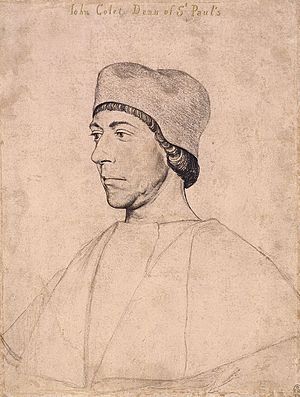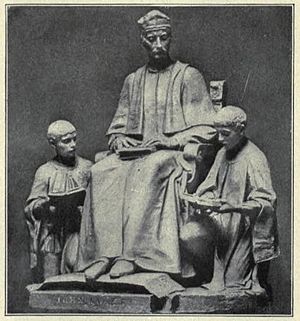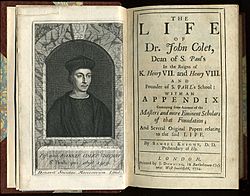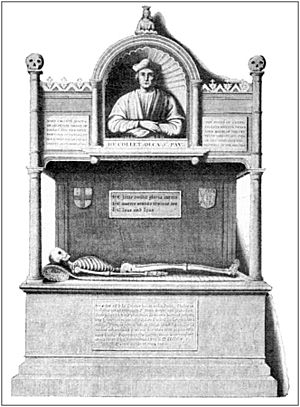John Colet facts for kids
Quick facts for kids
John Colet
|
|
|---|---|

Portrait drawing by Hans Holbein the Younger
|
|
| Born | January 1467 London, England
|
| Died | 16 September 1519 (aged 52) London, England
|
| Alma mater | Magdalen College, Oxford |
| Era | Renaissance philosophy |
| Region | Western philosophy |
| School | Renaissance humanism |
|
Main interests
|
Theology |
|
Influences
|
|
|
Influenced
|
|
John Colet (born January 1467, died September 16, 1519) was an English Catholic priest and a leader in education. He was a smart scholar, a Renaissance humanist (someone who studied ancient Greek and Roman ideas), and a religious thinker. He became the Dean of St Paul's Cathedral in London.
Colet believed that the Bible should guide people's lives. He also wanted to make Christian teachings fresh and exciting again. He was a key figure in linking humanism with ideas for improving the Church. John Colet was a good friend of Erasmus, another very important thinker of that time.
Contents
Early Life and Education
John Colet was born in London in January 1467. He was the oldest son of Sir Henry Colet, who was the Lord Mayor of London twice.
John went to St Anthony's school and then to Magdalen College, Oxford. He earned his Master of Arts degree there in 1490. In 1493, he traveled to Paris and then to Italy. While abroad, he studied different types of law, early Christian writings, and the Greek language.
Time Abroad and New Ideas
During his travels, John Colet met important thinkers like Budaeus (Guillaume Budé) and Erasmus. He also learned about the teachings of Girolamo Savonarola, a reformer.
When Colet returned to England in 1496, he became a priest and settled in Oxford. There, he gave lectures on the letters of Saint Paul. He used a new way of understanding these texts, which was different from the old methods. This new approach fit well with the "new learning" of the Renaissance. His ideas greatly influenced Erasmus, who visited Oxford in 1498.
Becoming a Church Leader

John Colet held several important church positions. In 1505, he became the Dean of St Paul's Cathedral in London. This was a very important role. He continued to give lectures on the Bible. He also started a regular lecture series on religious topics three days a week at St Paul's. From 1505 to 1519, Colet used his position to preach, manage the church, explain the Bible, and improve education. He wanted to reform the Church.
Around 1508, Colet inherited a lot of money from his father. He used this money to plan and build St Paul's School. The school opened in 1512. It was meant to give young boys a good Christian education.
The famous teacher William Lilye was the first headmaster of the school. Colet made the Worshipful Company of Mercers (a group of merchants) the trustees of the school in 1510. This was one of the first times that people who were not priests managed an educational institution. Some people thought Colet's religious ideas were wrong, but the Archbishop of Canterbury, William Warham, protected him. Even King Henry VIII respected Colet, even though Colet preached against the King's wars with France.
Important Sermons
Colet gave many well-known sermons. One of his most famous speeches was given on February 6, 1512. He spoke to a meeting of church leaders in London. Colet spoke directly and honestly, saying he was "sorrowing for the ruin of the Church." He urged the leaders to think about how to reform the Church. This speech is known as the Convocation sermon.
Another important sermon was given before the King's court on Good Friday, 1513. At that time, England was thinking about going to war with France. In his speech, Colet spoke out against war. He told Christians that they should only fight for Jesus Christ.
A Christian Humanist Thinker
Colet's writings show his deep thoughts and added to the ideas of Christian humanism. He studied the works of many ancient and early Christian writers. These included Cicero, Augustine, Jerome, John Chrysostom, Ignatius of Antioch, Lactantius, and Polycarp.
In his writings, Colet also mentioned Italian humanists and philosophers like Marsilio Ficino and Giovanni Pico della Mirandola.
Erasmus once said about Colet, "When I listen to Colet it seems to me that I am listening to Plato himself." Erasmus likely showed Colet in this way to prove that someone could criticize the Church and still be a loyal priest. His description of Colet was partly a way to describe himself.
Colet's Legacy and Influence
People have studied John Colet's life and ideas many times over the years. His popularity has grown at different times. In the 1700s, Bishop Kennett studied Colet. His notes were used by Samuel Knight to write a biography of Colet, published in 1724.
Interest in Colet grew even more in the 1800s. More of his writings were published, along with another biography. Scholars believed Colet had a big impact on his friend Erasmus and on the English Reformation. Some later thinkers saw Colet as being similar to a Protestant, even though others believed he was simply a reformer who wanted to make the Church better.
Colet died in 1519 from a serious illness called the "sweating sickness." His memorial was in the south part of the choir at St Paul's Cathedral, but it was destroyed in the Great Fire of London.
Other Works
Besides his sermons, Colet wrote some comments on the Bible. He also wrote books called Daily Devotions and Monition to a Godly Life. Colet worked with Lilye, Erasmus, and Wolsey to create the official Latin Grammar. This grammar book was used in English schools for hundreds of years. We also have several letters that Colet wrote to Erasmus.
Lasting Impact
Today, John Colet's achievements are still celebrated by St Paul's School, St Paul's Girls' School, and St Paul's Juniors (which used to be called Colet Court). They have a special John Colet Day at St Paul's Cathedral every year.
The John Colet School in Wendover, Buckinghamshire, is named after him. There is also a road called Colet Gardens in London and a John Colet School in Sydney, Australia.
Colet's Ideas for Church Reform (1512)
In his famous Convocation sermon in 1512, Colet said that he was there because the Church needed to be reformed. First, he criticized how some priests were living. Colet explained that priests should be good examples and bring light to others. If they were dark figures instead, the Church would also become dark.
Colet pointed out four main problems he saw in the lives of corrupt priests:
- Pride: Colet believed that some priests cared more about the honor and importance of being a priest than about humbly serving the Church.
- Worldly Pleasures: He felt that many priests were too focused on enjoying worldly things and supported others who helped them find pleasure.
- Greed: Colet called greed a "plague" that blinded many priests. He said many joined the Church only to get rich or get promotions. Priests forgot that they should care more about the good they could do than about money. Colet stated that "every corruption, all the ruin of the Church, all the scandals of the world, come from the covetousness of priests."
- Worldly Jobs: The fourth problem was that priests had become more like servants of people than servants of God. According to Paul, priests should connect people with God. Their fight should be spiritual, like Jesus's. They needed to pray, read the Scriptures, and think deeply about them. They also needed to share God's word, give sacraments, and offer sacrifices for people.
Colet then talked about how the clergy (church leaders) needed to change. He said people should become humble, sensible, charitable, and focus on spiritual things. He believed that reform had to start with the priests so it could spread throughout the whole Church. Colet thought that new laws were not needed; instead, the old laws just needed to be followed.
Colet believed several things were very important for priests: a good, pure, and holy life, good behavior, a decent understanding of the Bible, knowledge of the Sacraments, fear of God, and love for a heavenly life.
Finally, Colet urged everyone to "return to the God of love and peace; return to Christ, in whom is the true peace of the Spirit which passeth all understanding; return to the true priestly life." He said, "Be ye reformed in the newness of your minds, that ye may know those things which are of God; and the peace of God shall be with you."
Memorials
There was a memorial to John Colet in the south part of Old St Paul's Cathedral.
A bronze statue of John Colet with two students, made by Hamo Thornycroft in 1902, stands proudly near the entrance of St Paul's School, London.
See also
- List of Erasmus's correspondents
 | Aaron Henry |
 | T. R. M. Howard |
 | Jesse Jackson |



